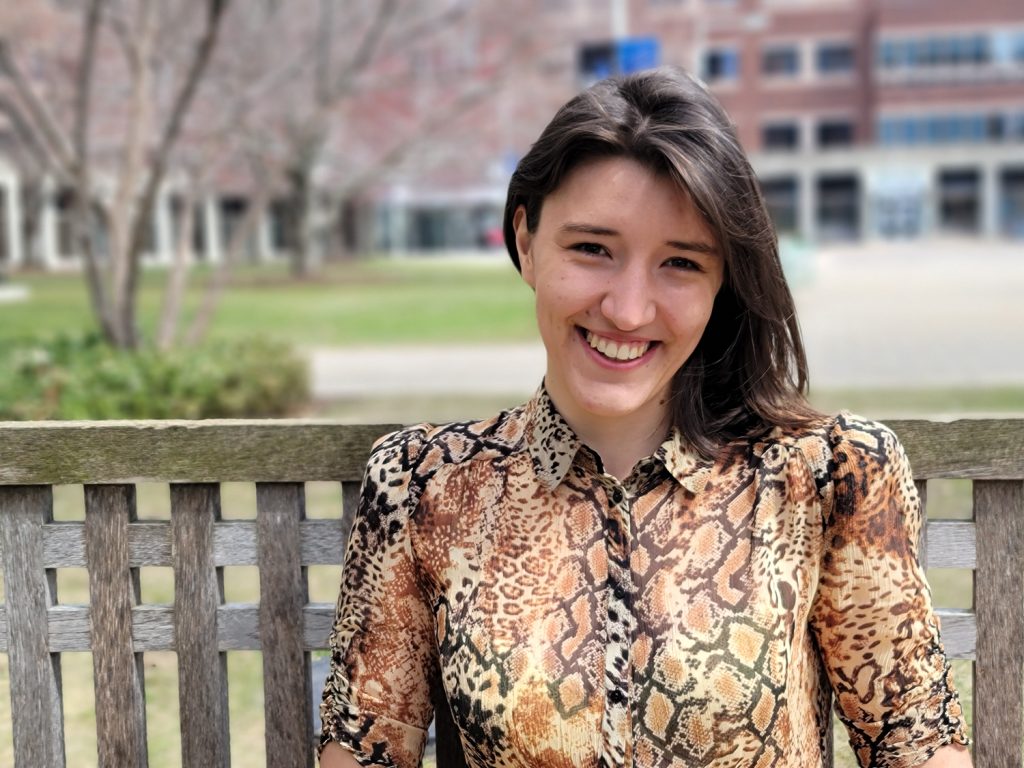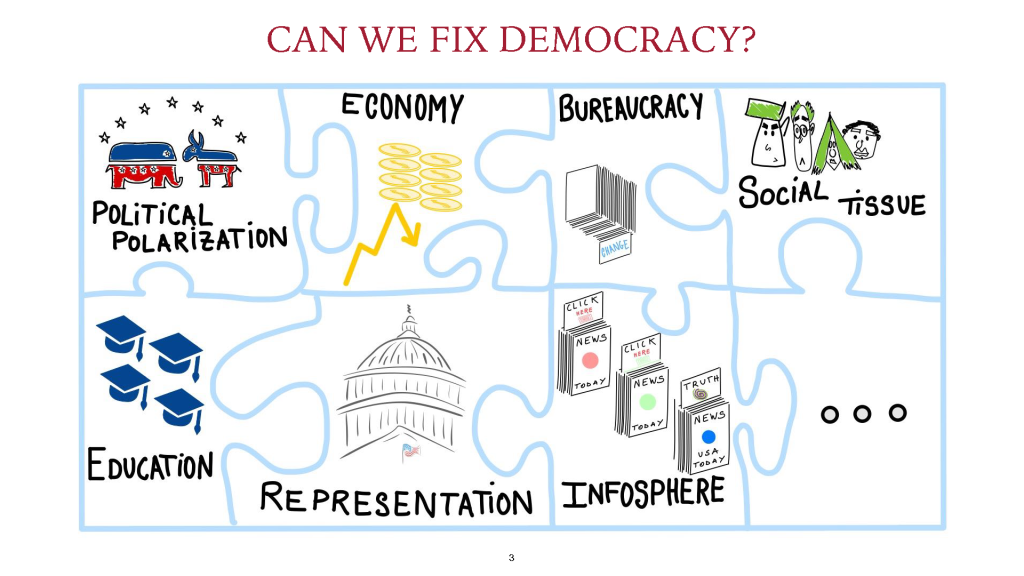
Aligning decision-making processes with democratic values
Manon Revel is a PhD candidate in the IDSS Social and Engineering Systems program, and a Democracy Doctoral Fellow at the Ash Center for Democratic Governance and Innovation at the Harvard Kennedy School. She works at the intersection of computational social choice and political theory to research decentralized governance and the alignment of decision-making processes with democratic principles. Ultimately, Manon hopes to uncover ways to incrementally improve governance in AI systems, democracies, or corporate environments. Following an early passion for journalism, Manon also studied the credibility crisis of traditional media as news migrated to the web. Throughout her academic journey, she worked in applied machine learning at Bell Labs and Aerospacelab, and at the intersection of technology and policy at the Center for Strategic and International Studies and Palantir. Aside from research, you can find Manon on basketball courts around Cambridge, or windsurfing somewhere in the Atlantic when back France, her home country.
What is the focus of your research?
I am passionate about aligning decision-making processes with democratic values. Take, for example, recommender systems, parliaments, corporate boards, or generative models – while seemingly unrelated, these infrastructures share a common goal of delivering positive outcomes on behalf of the groups they represent, formally or informally. Importantly, although often overlooked, the process through which the decisions come about can be as consequential as the outcome itself. It may be tempting to focus on the efficiency and accuracy of a process separately from its ethical and fairness principles as if both streams were independent. This dichotomy, however, seems artificial and potentially even dangerous.
What sort of knowledge and disciplines does your research bring together?
The root of my work stems from well over 200 years ago. In 1785, French philosopher and mathematician Nicolas de Condorcet published a short essay on decision-making theory titled Essay on the Application of Analysis to the Probability of Majority Decisions. This essay marked the birth of a new mathematical field, social choice theory, that studies the aggregation of individual choices. In part of his work, Condorcet abstracted voting mechanisms to explore the probability that a majority of voters finds the ground truth (in situations where such a thing exists). His theorem, which implies that a majority vote will outperform any fixed number of experts in specific yet realistic contexts, came at a time when James Madison (among others) was warning against the confusion of the multitude. Yet, Condorcet’s result hints to the exact opposite intuition: that of a societal collective intelligence. In other words, a process inclusive of all its members, under the right conditions, is guaranteed to lead to accurate outcomes. But Condorcet’s result is not an ode to the wisdom of crowds. Rather, it distinguishes between contexts in which crowds are wise and contexts in which crowds are confused.
At first, I was interested in further exploring the margins of Condorcet’s framework. The collective decision procedures I explored aggregated voters’ information about the issue at stake. But what about the information people have about one another? I may not know much about climate change science and be uninformed to vote on a bill proposed as a referendum. However, I know MIT colleagues I would gladly trust to vote on my behalf. This interpersonal information matters from both outcome and procedural perspectives. Under the supervision of Ariel Procaccia, Joe Halpern, Elchanan Mossel, and Ali Jadbabaie, my co-author Daniel Halpern and I explored regimes in which (transitively) delegating votes is likely to have neutral to positive impact on the outcome.
Leveraging probability and random graph theories, we characterized macro behavioral mechanisms that guarantee delegations to positively impact the outcome. Next, we ran a series of experiments with Adam Berinsky and found a striking alignment between the theoretical trends we had characterized and the empirical voter behaviors. Importantly, the theory and experiments rely on well-connected social networks and non-polarizing issues, and our results primarily apply to these particular setups. Recently, this has piqued the interest of several companies, who view the delegation system (commonly called liquid democracy) as a medium to poll employee or consumer pockets of expertise that may slip under the radar with current governance processes.
The delegation process is also interesting in itself. Consider how we currently choose representatives who make binding decisions on our behalf. Typically, we vote for someone who has made it onto a short-list through a separate process most people don’t have control over. The process is thought of as inclusive if all can vote. It treats all equally if every vote has the same weight. But these principles define inclusion and equality at the selection stage — not at the decisive stage. Thinking past the electoral framework made me wonder whether our democratic institutions are aligned with what we understand as democratic principles in 2023. In turn, I am investigating how normative theories of representation could evolve and cover a broader range of decision-making infrastructures. What are these principles concretely? What type of institutions would intrinsically be better aligned with these principles? And how does a change in the process substantively affect outcomes? I now work on these questions as a Doctoral Democracy Fellow at the Ash Center within the Harvard Kennedy School, building on centuries of literature on the concept and the justification of decision-making processes that involve representation of the many by selected few entities.
How can this research make an impact?
Efforts to update democratic governance are spreading worldwide and are also becoming common in the United States. The work I have been doing, and more generally, the field I have been a part of, attempts to benchmark and clarify our understanding of the proposed alternatives’ guarantees. Discontent with democracies has also spread, and the future of established institutions sometimes feels at risk. We try to align representative processes with democratic values to reinforce their legitimacy and efficiency and, ultimately, strengthen democracy.

Similar questions arise when considering deploying responsible artificial intelligence to which we delegate tasks. There, the interplay between the process and the outcome is even more evident: without dedicated attention to how a model is trained and the data on which it is trained, we may obtain results that are factually wrong or dangerously biased.
How do we align such decision-making processes with democratic principles? Who defines these principles, and how? How is a generative model technically prompted to be fair and ethical? These questions are fascinating and central to augmenting human capabilities safely with artificial intelligence. IDSS allowed me to explore both the mathematical and philosophical underpinnings of such problems. I see both sides of the coin as incredibly complementary, yet often considered separately. I hope this unique interdisciplinary approach, made possible by the SES program, will allow me to contribute to asking the right questions and finding meaningful, cogent answers.
What did you do before IDSS and why did you choose SES?
Before moving to Boston, I lived in Paris, France, where I obtained my Bachelor’s and Master’s degrees from Ecole Centrale Paris. There, I was trained in mathematics and physics and nurtured my many non-scientific interests outside school, working for local and web radio, founding a student newspaper and launching a basketball association! I was already most interested in topics revolving around political theory, democratic movements, human biases, or media environment, and I mostly explored these passions as side activities until I joined the Technology and Policy Program within IDSS. During this two-year master’s, I was given a chance to investigate social problems from a mathematical angle and researched the credibility crisis of the American media landscape. I joined the program in 2017, shortly after allegations about social media spreading false information during elections were raging in America. While much of the attention was dedicated to the social media platform, I wondered how traditional media, which had been dominating and gatekeeping the information industry, were being transformed by the fight for clicks and digital readership.
Academia, as an institution, and research, as a job, were utterly new to me: joining a PhD program was definitely not on my mind when I started TPP. However, it soon became evident that two years would not be enough to learn from the fantastic peers and advisors I had the chance to be surrounded with. I deeply admired how smart and knowledgeable, thoughtful and authentic, kind and impact-driven those around me were.
I was also genuinely distressed by the erosion of democratic values in online and offline environments and felt there was so much to understand about the causes and the effects of the dynamics behind these trends. While interdisciplinary research still aspires for clear definitions, boundaries and venues, the hybrid socio-technical nature of the challenges convinced me that we needed productive ways to mind the gaps between knowledge scattered across disciplines with the best views on a particular angle of the problems. Interdisciplinary research sounded both a risky adventure and a thrilling opportunity to contribute to building something new and relevant, and SES felt like a perfect home for the blends of problems I was passionate about and the mathematical tools I enjoyed working with and wanted to learn more about.
What are your favorite things about the IDSS and MIT communities? What do you do for fun?
The people. The fantastic diversity of interests and immense curiosity across the board turns any random encounter in a corridor into a thrilling journey to a land of knowledge I have had no idea about. And the researched topics are so awesome. A friend of mine researches implicit learning (or what can be transmitted beyond what is explainable) — have you heard of anything cooler? The community is also generous and supportive. I found the PhD hard at times, but the help and kindness of the MIT community, ready to lift you up when you are down, has made this entire journey invaluable.
My favorite things to do are probably playing basketball, windsurfing, or reading a book (especially if written by Stefan Zweig). My mum also got me into running, but it is not always as fun as my other hobbies (don’t tell her I said that, she is kind of addicted to running!).



